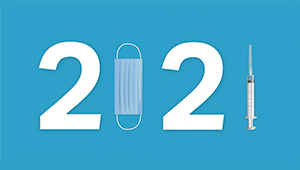Top research highlights in 2023
Video produced by Melissa Parson
From pain management to cervical cancer screening, these are the research stories that made headlines over the last year
In 2023 …
- Collaboration drove important progress in improving screening for cervical cancer
- A new study on the lives of kinless older adults with dementia added insight where evidence is scarce
- Working alongside patient partners led to a better tool for patients, families, and clinicians to address persistent pain
Kaiser Permanente Washington Health Research Institute (KPWHRI) contributed to these achievements and more in 2023. These highlights are the result of incredible teamwork, creativity, and dedication to the institute’s mission to improve health and health care.
Key collaborations
KPWHRI researchers are experts in conducting systematic reviews, which look at lots of different studies and summarize the available evidence on a specific topic. This year, they helped lead a review of the benefits and harms of skin cancer screening to help inform national guidelines, as part of a cross-region team at the Kaiser Permanente Evidence-based Practice Center.
A huge study in partnership with the University of Washington found that mailing home testing kits significantly increased screening rates for cervical cancer. The kits — which test for the human papillomavirus (the main cause of cervical cancer) — are now available for Kaiser Permanente Washington patients.
Also, a study using data from the University of California San Diego’s Rancho Bernardo Study of Healthy Aging investigated changes in the brain associated with hearing impairment, to better understand the connection between hearing loss and dementia.
And 2 studies with colleagues at the University of Washington and Seattle Children’s, using data from Kaiser Permanente Washington participants, added important knowledge about antibiotic-resistant E. coli as well as traumatic brain injury.
Vaccine safety and clinical trials
This year, the KPWHRI Vaccine and Treatment Evaluation Unit (VTEU) evaluated the mpox vaccine for adolescents, helping to inform vaccine approval for 12- to 17-year-olds. The VTEU also continued follow-up with participants enrolled in the first-ever trial of the SchistoShield vaccine to prevent schistosomiasis.
The U.S. Influenza Vaccine Effectiveness (FluVE) team enrolled 914 participants to track respiratory diseases during cold and flu season. The data from their surveillance helps inform vaccine timing and development of new vaccines.
Bringing new information to light
Growing numbers of adults are alone when they develop dementia, and do not have family members to help with their care. But there is little research specific to this population. KPWHRI researchers and affiliates used data from the Adult Changes in Thought (ACT) Study to gain insight into the lives of kinless older adults with dementia, gathering important data on their life trajectories, care needs, and challenges.
Another research team conducted the first study to look at adolescents’ use of a patient portal and secure messaging with their health care team, with the goal of matching the online tools with patients’ needs. And a study team produced the first estimates of the incidence of polycystic ovary syndrome (PCOS) in the U.S., helping to better understand the impact of this common and complex condition.
Better treatment for substance use
In partnership with colleagues at Kaiser Permanente Washington, KPWHRI researchers tested a novel way to integrate alcohol-related care into primary care. The approach resulted in more people getting screened annually for alcohol use and also increased the number of people who were diagnosed with alcohol use disorder and began treatment.
A separate trial found that adding nurse care managers to primary care clinics successfully increased medication treatment for opioid use disorder, which is effective and lifesaving but rarely provided in primary care. And researchers looked at the difference between medical and nonmedical cannabis use, finding that medical cannabis use was associated with a lower risk of moderate to severe cannabis use disorder. This could help inform screening for symptoms.
Working to understand impact
The Center for Community Health and Evaluation (CCHE) found that a quality improvement project that used texting and fotonovela comics to engage with people overdue for colorectal cancer screening helped increase screening rates. The texts and stories were designed to address known barriers to screening and provided encouragement and educational materials for recipients.
And a collaborative study evaluated the impact of Seattle’s Sweetened Beverage Tax, finding improved public health outcomes since the tax went into effect.
Adding evidence for high-performing suicide risk prediction
Models designed to predict suicide risk are an important tool for reducing fatal and nonfatal self-harm. KPWHRI researchers compared 5 different types of models to find out if using more complex machine learning and adding extra information helped the models perform better. They found that simpler models performed similarly to more complex ones, which is helpful insight for health care organizations currently using or hoping to use these models in clinical care.
Tools for patients and families
The Center for Accelerating Care Transformation (ACT Center) developed a toolkit alongside patient partners that offers practical tips and resources for anyone experiencing persistent pain, which is the leading cause of long-term disability in the U.S.
Also, collaboration with families helped researchers culturally adapt a training program for caregivers of people with dementia to better serve Latino communities. And a mobile application designed to engage smokers who are ambivalent about quitting — a group often ineligible for other treatments — showed promising results in a pilot study.
Stay tuned for much more to come in 2024. We wish everyone a safe, healthy, and happy new year.
By Amelia Apfel
2022 in review

Top research highlights in 2022
From cardiovascular health to cancer screening, these are the research stories that made headlines over the last year.
2021 highlights

Top 10 research highlights in 2021
We look back at 2021 research findings, including on COVID-19 vaccines, health equity, dementia, and suicide risk factors.
2020 highlights

10 ways we helped chart a safer passage in 2020
KPWHRI responded to the COVID-19 hurricane with actions to improve health worldwide.


